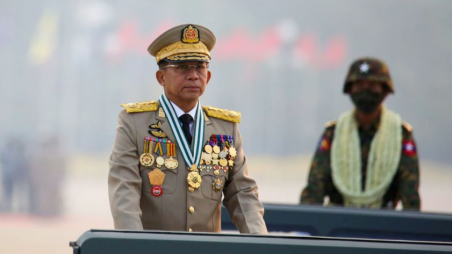Myanmar junta enacts harsh election law, including death penalty for dissent
The controversial law, enacted on Tuesday, comes five months before the scheduled poll and amid growing insecurity following a wave of targeted killings of military supporters and former officers in junta-held areas such as Yangon

Myanmar's military regime has introduced a new electoral law that allows the death penalty for disrupting the upcoming general election, as junta chief Min Aung Hlaing seeks to crush dissent ahead of the planned December vote.
The controversial law, enacted on Tuesday, comes five months before the scheduled poll and amid growing insecurity following a wave of targeted killings of military supporters and former officers in junta-held areas such as Yangon, reports The Irrawaddy.
Under the new legislation, penalties range from 3 to 5 years in prison for election sabotage; 5 to 10 years — or life imprisonment if committed as a group — for damaging ballot boxes, polling stations, or voting machines; and 10 to 20 years for causing serious harm to voters, polling staff, candidates, or officials. Offences that result in death will be punishable by execution.
The law is widely seen by analysts as a move to both reassure registered political parties and election staff, and to deter any form of protest or resistance. "The new law is intended to ease concerns of election staff and political parties registered for the junta's poll while quashing dissent," analysts say.
The newly formed election security committee will be chaired by the minister of home affairs, with the deputy defence minister as deputy chair and the national police chief as secretary.
This committee is tasked with monitoring domestic and international groups during the election, taking action against disruptors, and forming supporting local committees. The Ministry of Home Affairs will also be responsible for the personal security of elected candidates, while local police will protect election staff and candidates.
Despite these sweeping measures, an election staffer from the Wa Self-Administered Division in northern Shan State, controlled by the United Wa State Army, stated that they had yet to receive instructions from the junta's Union Election Commission on any poll-related preparations.
Critics have drawn comparisons between the current law and previous authoritarian measures. "The new law echoes legislation enacted by former junta leader Than Shwe, which outlawed any challenge to the National Convention – a sham process to entrench military rule under the guise of democratic reform," observers noted. However, Min Aung Hlaing has gone even further, upgrading the maximum penalty from 20 years in prison to life imprisonment or death.
Although the junta claims the law aims to ensure a "peaceful and successful" election, analysts argue it will primarily serve to suppress the public, most of whom oppose the planned poll. "While the regime claims the legislation will help guarantee peaceful and successful elections, analysts warn it will be used to intimidate the public – the majority of whom are against the proposed poll – into silence."
In addition to the Election Protection Law, the junta has made amendments to rules governing elections to the Pyithu Hluttaw (Lower House), Amyotha Hluttaw (Upper House), and regional and state parliaments. On Monday, it also passed a second amendment to the Political Parties Registration Law.
Campaigning is expected to begin in late September, although the regime has not yet announced an official election date. The military has stated that voting will be held in phases from December to January.
The feasibility of such an election remains in question. The junta has reportedly lost control of over 80 towns, particularly in ethnic minority regions like Rakhine, Chin, and Shan states.
This casts serious doubt on the Union Election Commission's claim that elections can be held in 267 of the country's 330 townships. The claim has led to speculation that the regime may deploy conscripts to secure polling stations in conflict zones.
International reactions have been largely critical. The United States, European nations, Myanmar's civilian National Unity Government, and various pro-democracy groups have condemned the planned election as a facade for continued military rule.
Malaysia, current chair of ASEAN, has stated that "hostilities must end before any credible poll can take place."
In contrast, neighbouring countries including China, India, and Thailand — along with ASEAN member Cambodia and military allies Russia and Belarus — have expressed support for the junta's election plan.



 Keep updated, follow The Business Standard's Google news channel
Keep updated, follow The Business Standard's Google news channel
















